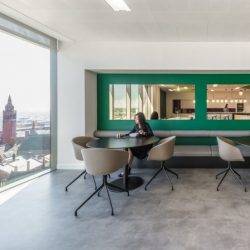November 6, 2018
CIPD research argues role of HR is increasingly vital to the world of work
 A new report from the CIPD has found that most of those working in the HR and people management sector are confident exercising their judgement, with six in ten (64 percent) agreeing their job gives them the opportunity to fully express themselves as a professional. But more than just providing stimulating work, the people profession in 2018: UK and Ireland report shows the profession enables individuals to contribute to the ‘greater good’ and gives them a sense of purpose. People professionals also enjoy their job, with more than two-thirds of respondents saying their work makes them happy (70 percent) and energised (67 percent).
A new report from the CIPD has found that most of those working in the HR and people management sector are confident exercising their judgement, with six in ten (64 percent) agreeing their job gives them the opportunity to fully express themselves as a professional. But more than just providing stimulating work, the people profession in 2018: UK and Ireland report shows the profession enables individuals to contribute to the ‘greater good’ and gives them a sense of purpose. People professionals also enjoy their job, with more than two-thirds of respondents saying their work makes them happy (70 percent) and energised (67 percent).







 The rise of data and digitisation has led to the demise of the traditional working day for many CEOs, with a third now checking business analytics first thing in the morning and last thing before they go to bed. This peaks at 54 percent among 25-34 year olds but drops to just 5 percent for leaders over 45, who are much more fixed to their desk. According to the research by Domo (registration required), 80 percent of these leaders prefer to wait until they are in the office to check in. Three quarters (71 percent) of CEOs across the UK and Ireland believe their business could be at risk from current blind spots in data access and skills, however, there is another demographic split. 84 percent of CEOs age 25-34 said it could be a risk, compared to just half of over 55s.
The rise of data and digitisation has led to the demise of the traditional working day for many CEOs, with a third now checking business analytics first thing in the morning and last thing before they go to bed. This peaks at 54 percent among 25-34 year olds but drops to just 5 percent for leaders over 45, who are much more fixed to their desk. According to the research by Domo (registration required), 80 percent of these leaders prefer to wait until they are in the office to check in. Three quarters (71 percent) of CEOs across the UK and Ireland believe their business could be at risk from current blind spots in data access and skills, however, there is another demographic split. 84 percent of CEOs age 25-34 said it could be a risk, compared to just half of over 55s.






 Although the majority of business leaders rate their business as efficient, nearly a third of respondents to a recent survey waste up to 65 working days per year on administrative tasks, with over half wasting the equivalent of a working month. Priority Software’s Business Process Efficiency Index 2018 suggests business leaders are struggling to take charge of company productivity; and while senior decision-makers expressed the desire to spend more time planning for the future of their businesses, they said too much time is currently occupied by administrative tasks.
Although the majority of business leaders rate their business as efficient, nearly a third of respondents to a recent survey waste up to 65 working days per year on administrative tasks, with over half wasting the equivalent of a working month. Priority Software’s Business Process Efficiency Index 2018 suggests business leaders are struggling to take charge of company productivity; and while senior decision-makers expressed the desire to spend more time planning for the future of their businesses, they said too much time is currently occupied by administrative tasks.
 Under half (47 percent) of British managers ‘completely agree’ that they would recommend their workplace to others, lagging behind other countries, such as Austria (66 percent), Finland (53 percent), Switzerland (53 percent), and France (51 percent). This is according to a Cornerstone OnDemand and IDC survey of over 1,900 European HR, IT and line of business managers,
Under half (47 percent) of British managers ‘completely agree’ that they would recommend their workplace to others, lagging behind other countries, such as Austria (66 percent), Finland (53 percent), Switzerland (53 percent), and France (51 percent). This is according to a Cornerstone OnDemand and IDC survey of over 1,900 European HR, IT and line of business managers, 

















November 5, 2018
An intersectional approach to trends in workplace design at Orgatec 2018
by Mark Eltringham • Comment, Workplace design
More →